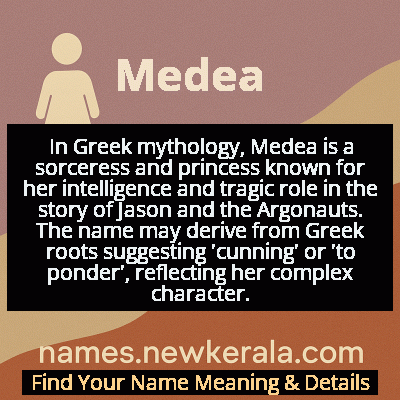Medea Name Meaning & Details
Origin, Popularity, Numerology Analysis & Name Meaning of Medea
Discover the origin, meaning, and cultural significance of the name MEDEA. Delve into its historical roots and explore the lasting impact it has had on communities and traditions.
Name
Medea
Gender
Female
Origin
Greek
Lucky Number
1
Meaning of the Name - Medea
In Greek mythology, Medea is a sorceress and princess known for her intelligence and tragic role in the story of Jason and the Argonauts. The name may derive from Greek roots suggesting 'cunning' or 'to ponder', reflecting her complex character.
Medea - Complete Numerology Analysis
Your Numerology Number
Based on Pythagorean Numerology System
Ruling Planet
Sun
Positive Nature
Leaders, ambitious, highly driven, self-reliant, innovative.
Negative Traits
Overly aggressive, domineering, impatient, selfish.
Lucky Colours
Red, orange, gold.
Lucky Days
Sunday.
Lucky Stones
Ruby, garnet.
Harmony Numbers
2, 3, 9.
Best Suited Professions
Entrepreneurs, managers, engineers.
What People Like About You
Courage, determination, leadership.
Famous People Named Medea
Medea of Colchis
Mythological sorceress
Central figure in Jason and the Argonauts legend; known for helping Jason obtain the Golden Fleece
Medea Benjamin
Political activist
Co-founder of Code Pink and Global Exchange; prominent peace activist and author
Medea de Novara
Actress
Italian actress known for her roles in 1950s and 1960s films including 'Hercules' and 'The Trojan Horse'
Medea Abrahamyan
Chess player
Armenian chess Woman Grandmaster; multiple-time Armenian women's chess champion
Name Variations & International Equivalents
Click on blue names to explore their detailed meanings. Gray names with will be available soon.
Cultural & Historical Significance
Medea's narrative has been interpreted through various lenses—as a commentary on foreignness and otherness in Greek society, as an exploration of maternal ambivalence, and as a representation of feminine rage against patriarchal oppression. Throughout history, her story has been adapted in countless plays, operas, films, and novels, each generation finding new relevance in her struggle. From Seneca's Roman adaptation to modern feminist reinterpretations, Medea continues to provoke discussion about justice, passion, and the limits of human behavior. Her enduring cultural relevance demonstrates how ancient myths continue to speak to contemporary concerns about gender, power, and morality.
Extended Personality Analysis
Individuals named Medea are often perceived as possessing intense, complex personalities marked by intelligence, passion, and determination. They tend to be highly strategic thinkers who approach challenges with cunning and resourcefulness, much like their mythological namesake who used her wits and magical abilities to overcome obstacles. These individuals often demonstrate fierce loyalty to those they love but can become formidable adversaries when betrayed or wronged. The name carries connotations of emotional depth and powerful convictions, suggesting someone who feels things intensely and acts with purpose.
However, the mythological association also implies potential for dramatic emotional extremes and a capacity for transformative action, whether for creation or destruction. Modern bearers of the name often develop a strong sense of identity that acknowledges this complex legacy while forging their own path beyond the mythological narrative. They may exhibit remarkable resilience and independence, coupled with a deep understanding of human nature's complexities. The name suggests someone unafraid to make difficult decisions and stand by their principles, even when facing social disapproval or personal cost. This combination of intelligence, passion, and moral complexity makes Medea a name associated with individuals of remarkable depth and character.
Modern Usage & Popularity
In contemporary times, Medea remains an uncommon but culturally significant name choice, typically selected by parents with an appreciation for classical literature and mythology. The name's usage is most prevalent among families of Greek heritage or those with strong interests in classical studies. While the challenging mythological associations prevent widespread popularity, the name has seen occasional use among intellectuals, artists, and those seeking a name with profound historical resonance. In naming statistics, Medea appears rarely in birth records, often ranking outside the top 1000 names in English-speaking countries. However, it maintains a steady presence in artistic and academic circles, and has seen slight increases in usage following notable cultural productions or scholarly re-evaluations of the character. The name's modern appeal lies in its strength, uniqueness, and connection to one of literature's most compelling female characters, offering an alternative to more conventional classical names while carrying substantial cultural weight.
Symbolic & Spiritual Meanings
Symbolically, Medea represents the archetype of transformative feminine power, intelligence turned destructive, and the consequences of betrayed love. She embodies the 'foreign woman' who brings both salvation and ruin, representing the dual nature of wisdom and magic when fueled by passion. The name has come to symbolize the ultimate price of betrayal and the terrifying power of a woman wronged. In psychological terms, Medea represents shadow aspects of the feminine—rage, vengeance, and the willingness to destroy what one loves most when pushed to extremes. She symbolizes the conflict between maternal love and personal honor, between social expectation and individual desire. The name also carries connotations of cultural displacement and the experience of being an outsider, as Medea was a foreign princess in Greek society. In modern interpretations, she has become a symbol of female agency and the complex moral choices women face in patriarchal systems, representing both the destructive potential and liberating power of feminine anger and intelligence.

